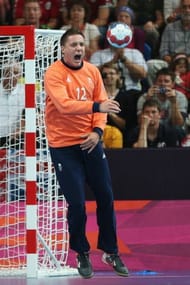Handball is not a particularly well-known sport in Great Britain. In terms of popularity and participation, it lags miles behind the likes of football, rugby, cricket, boxing, and tennis.
The authorities never paid much attention to such an obscure sport and it went largely without funding, with Great Britain's team never qualifying for any major tournaments and ceasing to operate for a brief time in 2003.
Things changed in 2005 when it was announced London would be hosting the 2012 Olympics. The hosts had automatic qualification to the handball tournament, which meant Great Britain would participate in Olympic handball for the first time in history, facing off against some of the best teams in the world in front of a global television audience.
Britain knew they had to avoid humiliation. They couldn't simply send a squad of amateurs out to be routed by seasoned professionals. And so, six years before the start of the games, a hunt was launched to find players capable of representing the country.
The first step was the launch of the Sporting Giants campaign. Sportsmen were invited to showcase their physical skills to a range of coaches before being fast-tracked into training for Olympic sports including handball.
Bobby White, a former football goalkeeper who had never even heard of handball, was one of four players selected through this scheme and would later captain Great Britain's Olympic squad.

Other players were selected from local handball clubs, or from lower division European teams. But with a lack of handball infrastructure in Britain, it was difficult to suitably train a competitive squad for the Olympics.
A government grant allowed the team to train full-time at an academy in Denmark. But in 2009, disaster struck when the government pulled funding for the project, meaning players had no money for living costs. Determined, they pushed through, with some members of the squad cleaning toilets, working in bakeries or borrowing money to continue training.
The next year, another solution was found: a deal was struck to send five players out to insolvent German club TUSEM Essen. It was an arrangement that worked for both sides: Britain's fledgling players gained valuable experience in a top European league whilst Essen enjoyed a cheap source of raw yet talented players.
2012 came and Britain had something approaching a competitive squad. The 14 players selected had worked hard and training as much as possible, playing competitively in Europe and bonding as a team. After years of preparation, they were ready for anything that would be thrown at them.
In London's brand new handball arena, The Copper Box, Britain's team faced off against Iceland, Sweden, Argentina, Tunisia, Sweden, and France. But there was to be no fairy tale ending. Despite opening the scoring against European champions France, Team GB eventually finished bottom of their group, having lost each of the five games they played.
But it wasn't all doom and gloom. After the Olympics, handball participation in the country sky-rocketed, and the nation now had the core of a team ready to compete in future competitions.
Team GB may not have achieved Olympic success, but their hard work in the face of adversity was not in vain; they had introduced an entire country to the sport of handball.
